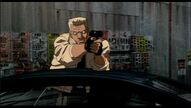I specially put it on the theatrical version in 1995, because the comment area on the live-action version has been lost, and I don't want to cause unnecessary trouble. When the live-action version of the global box office was violently killed, and the capital side once again pinned its hopes on this piece of land with a lot of money and stupid people, and thus pervasively and aggressively marketed it, most of the comments were nothing more than that Hollywood had once again destroyed the classics and obliterated the profoundness. But critics seem to have deliberately overlooked this point in order to show their diligence: the pursuit of profundity in a commercial film is as comical as the pursuit of box office in an art film. From a personal point of view, except for "The Matrix" and "Blade Runner" in history, there are basically no cyberpunk movies that can perfectly combine literature and business.
The comments on live-action movies are roughly the same as above. What I want to discuss this time is actually the eternal theme that has existed as its soul since the birth of cyberpunk: the definition of "self" and "world".
Although the number of neurons in the human brain is even greater than the total number of stars in the universe, human consciousness is, in the final analysis, nothing more than a massive interaction of electrical signals. That is, in theory. As long as the computational load is large enough and the model is correct enough, a computer can perfectly simulate human brain activity. In the worldview of cyberpunk, in the future where electronic technology has made great progress, human beings have already obtained this kind of computer, and can back up, transmit, simulate, etc. brain activities through this kind of computer, and what follows is the The pursuit of human reconstruction technology. Imagine this scenario: when you are dying, people back up your consciousness in a memory, and then quickly create a young and delicious body. Then import your consciousness...or there are countless public bodies all over the world, if you want to go to another part of the earth, it only takes a few seconds to transfer your consciousness from this body to that body. ...Then the question is, how can you prove that the you before the transfer and the you after the transfer are the same person? If you keep replacing your native body with artificial parts, when will you stop being called you? And going a little deeper from these two perspectives, how can you prove that you are indeed transferred, instead of thinking trapped in the virtual world of the computer? If human beings create artificial intelligence, he also has feelings and can dream, then what is the difference between him and humans?
Through the analysis of a large number of cyberpunk works, I found a very interesting phenomenon. Easterners particularly like to explore the former question, while Westerners particularly like to explore the latter question. This is probably also related to two completely different ways of thinking. The traditional way of thinking in the East is idealism, which believes that perception determines the world, so they pay more attention to self-reflection and adjustment. The Western traditional thinking is materialism, which believes that the world determines perception, so they pay more attention to the change of the world. Ghost in the Shell is a typical Eastern-style philosophical thinking, and The Matrix is a typical Western-style philosophical thinking.
And the reason for this kind of skeptical thinking about the self and the world is actually the same for all human beings, and it is a self-protection mechanism in a mutation environment. The uncanny valley effect tells us that what humans fear most is things that are similar to themselves but different in nature, and what cyberpunk creates is precisely a world full of such things, which comprehensively shows the collision of new technology and old thinking. And this is why many cyberpunks like to set the stage background in places like Hong Kong slums. To remain oneself in such a world has become a pursuit that human beings are very passionate about. But at the same time, from the results, if technology can really develop in this way, it is inevitable for humans to transform their bodies and minds. Therefore, people who have seen a lot of cyberpunk often come to the conclusion that "human beings will destroy themselves sooner or later. "Such a pessimistic conclusion.
In general, this kind of thinking is very necessary, but the insurance effect on the future may be minimal. As the "Puppet Master" said, this kind of worry is just a kind of "ego" for "self", and it is the same as worrying about the sky or worrying about the ancients. Because human beings' transformation of themselves, including the adaptation of ethics and morality to technology, has always been a gradual process, not a sudden completion overnight. Just like a doll that conforms to the uncanny valley effect, it will look scary at first glance, but if you use a model that is no different from a real person, replace one ear today, replace one eye tomorrow, and slowly turn it into a human If it looks like a couple, everyone can accept it. The so-called moral ethics of human beings are always to serve themselves, not to restrain themselves. A century ago, abortion was considered the same crime as murder in Christian culture, and it was a heinous act, because the technology of abortion was not mature enough, the risk was high, and few people tried it. With the improvement of abortion technology, more and more women began to accept abortion, so the Christian system ethics has "adjusted" itself to be more adaptable to the status quo. As Da Liu said in "The Age of Angels", even in a civilized world, as long as there is demand, ethics will always come second. No one can resist the temptation to fly freely, even if it means combining their genes with those of birds. Therefore, if one day in the future the world of cyberpunk is really realized, people at that time must have convinced themselves to accept this change. Whether it is the collective addiction of all human beings to the virtual world, or the destruction of human beings due to the backlash of their own products, it is also the inevitable "destiny" of human beings.
View more about Ghost in the Shell reviews











